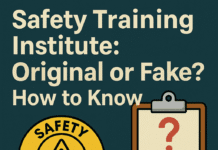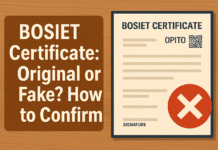
Certified Safety and Health Manager (CSHM): Ensuring Workplace Safety
Certified Safety and Health Manager (CSHM) : In today’s fast-paced world, ensuring the safety and well-being of employees in the workplace is of utmost importance. Companies and organizations across various industries are constantly seeking professionals who can take charge of safety management and health initiatives. The Certified Safety and Health Manager (CSHM) plays a vital role in this endeavor, and in this article, we will explore the world of CSHMs, their significance, certification requirements, and the impact they make on workplace safety.
Introduction to Certified Safety and Health Manager (CSHM)
Certified Safety and Health Managers are experts in occupational health and safety management. They are responsible for developing, implementing, and monitoring safety programs to prevent workplace accidents and ensure regulatory compliance. CSHMs work across various sectors, including manufacturing, construction, healthcare, and more.
Importance of Workplace Safety
Workplace safety is paramount for both employees and employers. Ensuring a safe working environment not only prevents injuries and accidents but also boosts employee morale and productivity. CSHMs are instrumental in creating a culture of safety within organizations.
The Role of a Certified Safety and Health Manager
A CSHM’s role involves risk assessment, hazard identification, safety program development, employee training, and compliance with safety regulations. They act as a bridge between employees and management, promoting safe work practices.
Becoming a Certified Safety and Health Manager
To embark on a career as a CSHM, one needs to meet specific requirements. Aspiring candidates should possess relevant work experience and a background in occupational health and safety.
CSHM Certification Requirements
To obtain the CSHM certification, candidates must pass a comprehensive examination administered by recognized certifying bodies. The exam covers various aspects of safety management, including risk assessment, emergency response, and legal compliance.
Benefits of Obtaining CSHM Certification
Becoming a CSHM opens up doors to numerous benefits. Certified professionals often enjoy higher salaries, job security, and career advancement opportunities. Moreover, CSHMs are in high demand across different industries.
Career Opportunities for CSHMs
CSHMs can pursue a variety of career paths, including safety management, risk assessment, and consulting. They can work in manufacturing, construction, healthcare, government, and more.
Common Industries and Sectors for CSHMs
CSHMs are needed in industries such as oil and gas, manufacturing, construction, and healthcare. Their expertise is invaluable in preventing accidents and ensuring compliance with safety regulations.
CSHM Certification vs. Other Safety Certifications
While there are several safety certifications available, the CSHM certification stands out due to its comprehensive curriculum and rigorous examination process. It is recognized worldwide as a symbol of excellence in safety management.
CSHM Code of Ethics and Professional Conduct
CSHMs adhere to a strict code of ethics and professional conduct, ensuring that they maintain the highest standards of integrity and professionalism in their work.
Continuous Professional Development for CSHMs
To stay current in their field, CSHMs engage in continuous professional development activities, attending seminars, workshops, and conferences related to safety and health management.
The Impact of CSHMs on Workplace Safety
CSHMs make a significant impact by reducing workplace accidents and improving employee well-being. Their expertise and leadership foster a culture of safety within organizations.
CSHM Exam Preparation Tips
Preparing for the CSHM exam requires dedication and hard work. Candidates can benefit from study materials, practice exams, and peer support.
Conclusion
In conclusion, the role of Certified Safety and Health Managers is indispensable in creating a safe and secure work environment. Their commitment to safety, adherence to high ethical standards, and continuous professional development make them the guardians of workplace well-being.
Site Safety Supervisor Training Course
Certified Industrial Hygienist (CIH)
Certified Safety and Health Official (CSHO)
Process Safety Management (PSM) Certification
Certified Hazardous Materials Manager (CHMM)
Frequently Asked Questions
- What is the primary responsibility of a Certified Safety and Health Manager (CSHM)?A CSHM is primarily responsible for ensuring workplace safety, which includes risk assessment, hazard identification, safety program development, and employee training.
- How does CSHM certification benefit professionals?CSHM certification can lead to higher salaries, job security, and career advancement opportunities. It is a symbol of excellence in safety management.
- What industries require the expertise of CSHMs?CSHMs are in demand across various industries, including manufacturing, construction, healthcare, and oil and gas.
- How can one prepare for the CSHM certification exam?Candidates can prepare for the CSHM exam by studying relevant materials, taking practice exams, and seeking peer support.
- What impact do CSHMs have on workplace safety?CSHMs significantly reduce workplace accidents, improve employee well-being, and foster a culture of safety within organizations.
























